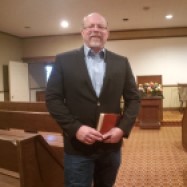Grace for Sodom and Gomorrah
We’ve all probably heard the story of Sodom and Gomorrah. It’s basically the idea that God looks down at these two cities, sees their wickedness, and makes the decision that “I’m going to destroy them.” It’s where we get the term hell fire and brimstone. But the main take-away from the story of Sodom and Gomorrah is not that God punishes sinners, but that He is actually willing not to punish sinners. God won’t give you and me what we deserve because of our sin if there can be found in our midst one that is righteous who can take our place.
Genesis 18:20–22
“Then the Lord said, ‘Because the outcry against Sodom and Gomorrah is great and their sin is very grave, I will go down to see whether they have done altogether according to the outcry that has come to me. And if not, I will know.’ So the men [that’s the angels] turned from there and went toward Sodom, but Abraham stood still before the Lord” (ESV).
Abraham and God are talking. Abraham hears in just a second that God is going to destroy the city because of their great sin, and Abraham does something incredibly bold. Like a defense lawyer, Abraham comes and stands before the Great Judge, and he makes a case for why the accused should be pardoned.
“Then Abraham drew near to God and said, ‘Will you indeed sweep away the righteous with the wicked? Suppose, God, there are fifty righteous within the city. Will you then sweep away the place and not spare it for the fifty righteous who are in it?” (Gen. 18:23–24 ESV).
Abraham’s request was something that had never been asked of God before. “God, will You not punish sinners? Instead of bringing destruction because of the sin of the many, God, will You spare the many because of the righteousness of the few?”
There was also a big concept in ancient Near Eastern culture called guilt by association or guilt transference. It’s the idea that because of the guilt of one, the consequences would be transferred to the many. Paul talks about it in Romans 5:12 (ESV): “Therefore, just as sin came into the world through one man, and death through sin, and so death spread to all men because all sinned.” Paul is talking about this idea of guilt transference. You just have this one guy. His name is Adam, who sinned, and what the Bible says is because he sinned, the consequences spread to everybody.
But here, for the very first time, Abraham comes before the Lord and asks Him to consider enacting righteousness transference. And what’s even more remarkable than Abraham asking that of God was that God said yes.
Genesis 18:26 (ESV) says: “And the Lord said, ‘If I find at Sodom fifty righteous in the city, I will spare the whole place for their sake.’” There was a problem. And as soon as Abraham asked God that crazy question and God said yes, it hit Abraham like a ton of bricks. There might not be fifty righteous in Sodom. And so in verse 28, Abraham asks God if He would spare them for forty-five righteous people, and God says yes. Then forty righteous people. Thirty. Twenty. Ten.
What happens from here? God destroys the city. Why did He destroy it? The answer is very obvious. God obviously did not find ten righteous people in the city of Sodom or Gomorrah, and therefore He destroyed it. But what’s crazy about the story is that you get the sense that Abraham could have kept asking and kept lowering the number, and God would have kept saying, “Yes.”
You get the sense from the story that Abraham could have said, “God, will You save this city on behalf of five?” And God would have said, “Sure.” “Will You save the whole place on behalf of one righteous?” You get the sense that God would have said, “Yes.” Why didn’t Abraham keep asking? He realized one of the central truths in Scripture, one of the most amazing truths, one of the scariest truths in Scripture, and one of the most awesome truths in Scripture: God is willing to not punish sinners if there is one righteous that can be found among them, but none of us are righteous.
In Romans 3:10 (ESV), Paul talks about this very truth. “As it is written: ‘None is righteous, no, not one; no one understands; no one seeks for God. All have turned aside; together they have become worthless; no one does good, not even one.’”
Conclusion
And so, what is our hope? Our only hope to be pardoned for sin, because none of us are righteous, is that God will send to us One who is. What’s so amazing about God’s grace toward us is not that we were so wonderful. It’s not that we were so worth it that God died for us and took our place. What’s so amazing about grace is that we were so messed up and that we were so not worth it, and God came and died for us and took our place.
When you stand before God the eternal Judge and He asks you, “Why should I pardon you, sinner?” you’d better not say, “Because I was worth it.” Instead, you point to the right hand of the Father. “God, why should You pardon me? Because of Jesus. And God, I know You pardon sinners if one righteous can be found. He was found righteous.”
Recent Sermons
God won’t hear you!
September 19, 2017
Lies of the Church
May 08, 2017
The Pursuit of a Sinner~ Mark 2:14–17
February 21, 2017
